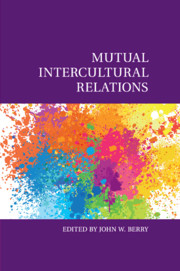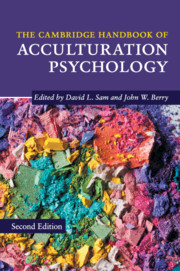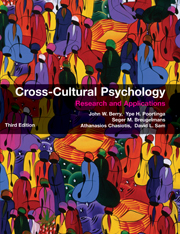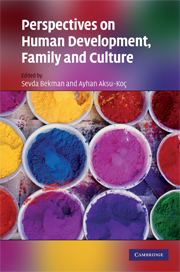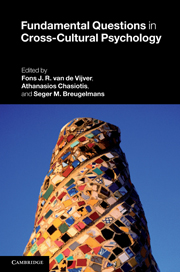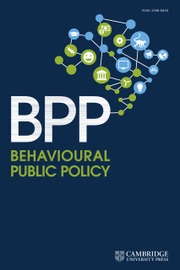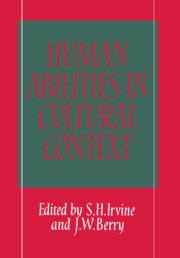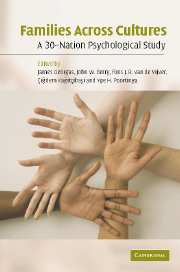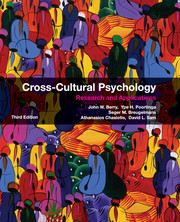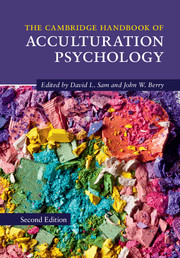Mutual Intercultural Relations
$51.99 (C)
Part of Culture and Psychology
- Editor: John W. Berry, Queen's University, Ontario
- Date Published: September 2019
- availability: Available
- format: Paperback
- isbn: 9781316635230
$
51.99
(C)
Paperback
Other available formats:
Hardback, eBook
Looking for an examination copy?
This title is not available for examination.
-
In culturally diverse societies, one of the biggest questions on our minds is 'how shall we all live together?' Mutual Intercultural Relations offers an answer to this fundamental and topical issue. By exploring intercultural relationships between dominant/national and non-dominant/ethnic populations in seventeen societies around the world, the contributors are each able to chart the respective views of those populations and to generate 'general' principles of intercultural relations. The research reported in this book is guided by three psychological hypotheses which are evaluated by empirical research: multiculturalism, contact and integration. It was also carried out comparatively in order to gain knowledge about intercultural relations that may be general and not limited to a few social and political contexts. Understanding these general principles will offer help in the development of public policies and programmes designed to improve the quality of intercultural relations in culturally diverse societies around the world.
Read more- Contains original research on intercultural relations which is global in scope
- Employs both dominant/national and non-dominant/ethnic samples to provide mutual perspectives
- Searches for 'universal' principles of intercultural relations that can be applied to public policies and programmes across all societies
Awards
- Winner, 2019 William B. Gudykunst Outstanding Book Award, International Academy for Intercultural Research
Reviews & endorsements
'This book offers a remarkable collection of contributions focussed on the critical issue of intercultural relations within multiethnic societies. Relations between dominant majorities and ethnic minorities are empirically compared across seventeen societies characterized on the basis of their cultural diversity and integration policies. Collaborators in each setting empirically tested the multiculturalism, contact and integration hypotheses resulting in a fascinating and intellectually stimulating book that sets the stage for the next decade of research in the field.' Richard Y. Bourhis, Emeritus Professor, Université du Québec à Montréal
See more reviews'The contemporary geopolitical world will embrace this important book. The underlying theme is 'How shall we all live together?' The substantial Mutual Intercultural Relations project, reported herein, combines the experience of John W. Berry, a renowned expert in this area, and the enthusiastic cooperation of scholars in seventeen pluralistic societies.' Walter J. Lonner, Western Washington University
'A unique compendium of psychological theory and research on acculturation and intercultural relations that examines the process and outcomes of intercultural contact - not only in terms of mutual and reciprocal perspectives, but also across a wide range of economic and socio-political contexts. Spanning sixteen countries, this impressive collection offers practical insights into 'cultures in contact' and provides a valuable resource for researchers in the field.' Colleen Ward, Victoria University, Wellington
Customer reviews
Not yet reviewed
Be the first to review
Review was not posted due to profanity
×Product details
- Date Published: September 2019
- format: Paperback
- isbn: 9781316635230
- length: 452 pages
- dimensions: 229 x 151 x 22 mm
- weight: 0.65kg
- contains: 17 b/w illus. 61 tables
- availability: Available
Table of Contents
1. Introduction John W. Berry
2. Intercultural relations in Russia Nadezhda Lebedeva, Victoria Galyapina, Zarina Lepshokova and Tatiana Ryabichenko
3. Intercultural relations in Latvia and Azerbaijan Nadezhda Lebedeva, Alexander Tatarko and Victoria Galyapina
4. Intercultural relations in Estonia Raivo Vetik, Maaris Raudsepp, Jüri Kruusvall, Larissa Kus-Harbord, Marianna Makarova and Aune Valk
5. Intercultural relations in Finland Asteria Brylka, Inga Jasinskaja-Lahti and Tuuli Anna Mähönen
6. Intercultural relations in Norway David L. Sam, Raivo Vetik, Marianna Makarova and Maaris Raudsepp
7. Intercultural relations in Germany Katja Hanke, Marieke C. van Egmond, Anette Rohmann and Klaus Boehnke
8. Intercultural relations in Switzerland Andrea U. Haenni Hoti, S. Heinzmann, M. Müller, A. Buholzer and R. Künzle
9. Intercultural relations in Greece Vassilis Pavlopoulos and Frosso Motti-Stefanidi
10. Intercultural relations in Italy Cristiano Inguglia, Pasquale Musso and Alida Lo Coco
11. Intercultural relations in Malta Gordon Sammut and Maryanne Lauri
12. Intercultural relations in Portugal Felix Neto and Joana Neto
13. Intercultural relations in Spain Hector Grad
14. Intercultural relations in India R. C. Mishra, S. Bano and R. C. Tripathi
15. Intercultural relations in Hong Kong Algae Kit Yee Au, Bryant Pui Hung Hui and Sylvia Xiaohua Chen
16. Intercultural relations in Australia Justine Dandy, Kevin Dunn, Jolanda Jetten, Yin Paradies, Lena Robinson and Tahereh Ziaian
17. Intercultural relations in Canada Saba Safdar, Gui Yongxia, R. C. Annis, R. Gibson and John W. Berry
18. Evaluation of the hypotheses and conclusions John W. Berry.
Sorry, this resource is locked
Please register or sign in to request access. If you are having problems accessing these resources please email [email protected]
Register Sign in» Proceed
You are now leaving the Cambridge University Press website. Your eBook purchase and download will be completed by our partner www.ebooks.com. Please see the permission section of the www.ebooks.com catalogue page for details of the print & copy limits on our eBooks.
Continue ×Are you sure you want to delete your account?
This cannot be undone.
Thank you for your feedback which will help us improve our service.
If you requested a response, we will make sure to get back to you shortly.
×
